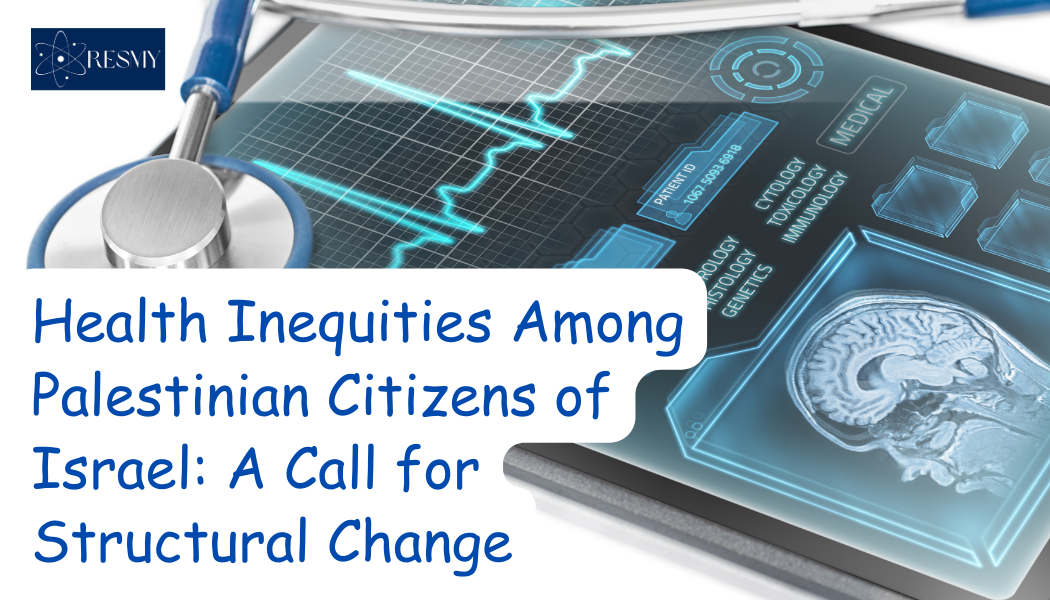Palestinian citizens of Israel (PCI) make up nearly 20% of the Israeli population. Despite having access to one of the world’s most efficient healthcare systems, PCI face significantly worse health outcomes and shorter life expectancies compared to Jewish Israelis. This disparity stems from deep-rooted structural racism and settler colonialism, factors often overlooked in the analysis of social determinants of health.
Historical Context and Structural Racism
The health inequities experienced by PCI are rooted in historical and structural factors. Following the establishment of Israel, Palestinians became a racialized minority in their own homeland. This racialization is a direct consequence of settler colonialism, which has led to systemic discrimination and marginalization. Critical race theory and settler colonial analysis reveal that the health disparities of PCI are not merely coincidental but are entrenched in the socio-political fabric of the state.
Health Outcomes and Inequities
Research has documented the health disparities between PCI and Jewish Israelis for decades. PCI have a life expectancy that is 3-4 years shorter on average, and they face higher mortality rates from various causes. For instance, PCI are 2.96 times more likely to die from motor vehicle injuries, 2.69 times more likely to die from respiratory diseases, and 2.25 times more likely to die from diabetes compared to Jewish Israelis. Additionally, the neonatal mortality rate for PCI is significantly higher, particularly in the southern regions where Palestinian Bedouin communities reside.
Social Determinants of Health
Various social determinants contribute to these health inequities. PCI communities often live in segregated towns with poor living conditions, limited access to healthcare, and inadequate educational and employment opportunities. These conditions are compounded by systemic issues such as poverty, violence, and home demolitions. Despite their inclusion in a highly efficient healthcare system, these structural determinants perpetuate health disparities.
The Role of Structural Racism
Structural racism is a critical factor driving health inequities among PCI. It encompasses the policies, systems, and institutions that reinforce discriminatory beliefs and the unequal distribution of resources. In Israel, structural racism manifests in various forms, including housing segregation, unequal education, employment discrimination, and limited access to healthcare. These factors collectively contribute to the poorer health outcomes observed among PCI.
Addressing Health Inequities
To address the health inequities faced by PCI, it is essential to acknowledge and tackle the root causes: structural racism and settler colonialism. This involves dismantling discriminatory policies and systems that perpetuate these disparities. Efforts must go beyond superficial interventions and instead focus on transformative changes that address the underlying socio-political structures.
Steps Toward Health Equity
Achieving health equity for PCI requires a multifaceted approach:
- Legal Reforms: Dismantling laws and policies that enshrine racial discrimination is crucial. This includes ending legalized supremacy and the associated racial hierarchies.
- Decolonization and Reparations: Beyond legal reforms, decolonization involves recognizing historical injustices and providing reparations to affected communities. This process must include restructuring societal and political relationships to ensure justice and equality.
- Supporting Local Resistance: Empowering PCI communities to resist various forms of discrimination is essential. This includes advocating for equitable access to education, housing, healthcare, and employment.
- International Pressure: The international community plays a significant role in holding Israel accountable for its discriminatory practices. Pressure from global entities can help ensure that Israel conforms to international laws and standards.
Conclusion
This study provide information of the health inequities faced by PCI are a direct result of structural racism and settler colonialism. By addressing these disparities requires a comprehensive approach that tackles the root causes and implements transformative changes. By acknowledging and addressing the historical and structural factors contributing to these inequities, it is possible to move towards health equity and justice for all people living in Israel. This effort must be driven by both local resistance and international support, ensuring that the health and well-being of PCI are prioritized and protected.
Other Topics: Medicine and Health Science, Natural Science, Agricultural Science, Engineering & Technology, Social Sciences & Humanities

